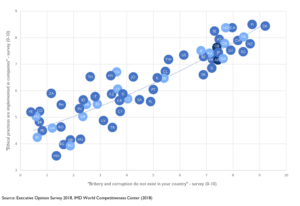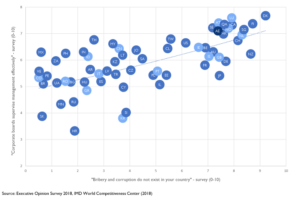
Corruption and ethical practices perceptions
The issues of governance scandals and corporate control failures are perennial and persistent. In the last year, companies and industries ranging from airlines to banking, data analytics, health technology, marketing, transportation and delivery, have been exposed to situations related to abusive or discriminatory working relationships, bribery, corruption, data breaches, or just simple fraud. The implication of any of the above is destructive for all stakeholders of a company: customers, employees, investors, and executives are all affected in different aspects of their lives. Equally important, is the fact that the society as a whole is also affected because the presence of corporate scandals erodes the confidence in organizations, increases the uncertainty and thus the cost in investing; it ultimately harms the credibility and reputation of officials and institutions at the firm and country level.
In this edition of the criterion of the month we present the relationship between variables from our dataset that capture the perception on corruption and practices within firms.
Research on corporate governance points to the legal and institutional framework as mechanisms that can address control failures. They are related with the rule of law in a country, the strength and independence of the judicial system, and the time it takes for decisions to be finalized and implemented. The top panel in Figure 1 presents the responses by mid- and upper level managers from our Executive Opinion Survey as to the existence of bribery and corruption. The answers are aggregated at a regional level and the higher number denotes a perception of lower presence of bribery and corruption in the country. As the figure outlines, Western Europe is characterized by the lowest presence of corruption followed by Eastern Asia and North America, while South America exhibits the highest.
Figure 1: Corruption perceptions by region
Figure 2: Ethical practices by region
Figure 3: Corruption perceptions and corporate board supervision on management
Even more telling is the relationship between corruption perceptions and implementation of ethical practices at the firm level. Figure 4 identifies a strong positive relationship between the two criteria with a correlation coefficient equal to 0.90.

Figure 4: Corruption perceptions and ethical practices in companies
Research Information & Knowledge Hub for additional information on IMD publications
To understand America’s aggressive shift on trade, you must first grasp the silent, slow building, decades-long erosion of American middle-class prosperity. This shift began well before President Trump and will outlive him. It is rooted in the col...
The Great Trade Hack by Richard Baldwin explains how Trump’s 2025 tariff blitz wasn’t economic strategy. It was grievance politics. Tariffs, Baldwin shows, are political placebos that won’t fix the U.S. economy but could fracture the global trade ...
On 12 May 2025, China and the United States released a joint statement that ended the recent escalation in tariffs. For 90 days each agreed to lower their tariffs by 115%. This only applies to import taxes imposed since 2 April 2025—all prior tari...
This paper presents a compact and intuitive framework that consolidates, simplifies, and extends results on the links between technology, trade, and labour market outcomes. It makes three main contributions. First, it presents closed-form solution...
This introduction offers a revisionist view of necessity entrepreneurship (NE). The volume editors are thereby challenging orthodox perspectives that equate NE solely with financial poverty and lack of employment and self-sustenance alternatives. ...
in Gensler, Gary (Ed.); Johnson, Simon (Ed.); Panizza Ugo (Ed.); Weder di Mauro, Beatrice (Ed.) / The Economic Consequences of The Second Trump Administration: A Preliminary Assessment, pp. 239-244 / PAris: CEPR Press, 2025
Research Information & Knowledge Hub for additional information on IMD publications
Published by International Institute for Management Development ©2025
Research Information & Knowledge Hub for additional information on IMD publications
Research Information & Knowledge Hub for additional information on IMD publications
Research Information & Knowledge Hub for additional information on IMD publications
Research Information & Knowledge Hub for additional information on IMD publications
Research Information & Knowledge Hub for additional information on IMD publications
Research Information & Knowledge Hub for additional information on IMD publications
in Journal of International Economics May 2025, vol. 155, 104065, https://doi.org/10.1016/j.jinteco.2025.104065
Research Information & Knowledge Hub for additional information on IMD publications
in I by IMD
Research Information & Knowledge Hub for additional information on IMD publications
in Smolka, Katrin M. (Ed.); Heugens, Pursey (Ed.); Bacq, Sophie (Ed.); Slade Shantz, Angelique (Ed.) / Necessity entrepreneurship: Getting beyond the binary (Research in the sociology of organizations, vol. 92), pp: 1-10 / Leeds: Emerald, 2025
Research Information & Knowledge Hub for additional information on IMD publications







